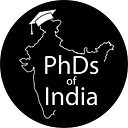Patience over passion
“I believe patience takes your PhD a longer way than passion. Of course, passion is necessary to do a PhD, but it’s the patience that ultimately gets you the degree. I personally didn’t think I would do a PhD but looking back, I think my inquisitiveness to learn new things took me towards that path.
After working as a data scientist for 2 years at RedHat, I felt I wasn’t suited for a corporate job although I had very supportive peers and mentors and ample opportunities. I wanted to pursue a Master’s but when that didn’t work out, I took a break, and eventually joined as an RA at IIIT Delhi and later converted to a PhD candidate in the same laboratory.
Working as an RA gave me a formal exposure to research and helped me assess what I liked and what I didn’t. I explored several avenues and realized application research interested me. It so happened that my supervisor received a WIPRO funding on the topic of hate speech analysis right around the same time, and thereby I decided to work on it as my PhD topic. I have been looking at the machine learning and NLP techniques that detect hate speech and how it spreads across social media platforms. I was fortunate to be awarded the Prime Minister Doctoral Fellowship in my first year because my project had industry collaboration and last year, I also received the Google scholarship. So funding was never an issue for me during this journey.
Initially, I also had access to free APIs and could collect data from an Indian setting easily on Twitter but the free access was then shut off. APIs became costlier, and I had to rely on available datasets which weren’t based in India, to conduct my study. Annotating the data and applying them to mathematical modeling also became a challenge. There was a period during the pandemic when I had only one project and nothing was working out for me. For over 2 months, I had nothing to show to our collaborators, which was quite stressful and personally demotivating. My initial publications also went through multiple rejections and revisions before being accepted. Publications look for novelty and complexity of work. But through my PhD work, I realized that we don’t need complicated systems to identify hate speech, especially if they are explicit in nature. Simpler methods can suffice for it, but simpler methods don’t sell. Therefore, backing my hypothesis with the appropriate set of data and logic was mentally taxing. Every rejection hurt and for someone who has been under-confident through most of her life, it did take a toll on me. Many times, I felt like crying reading the reviewers’ comments.
Now things are better because I can handle rejections more easily and also since I can finally see the finishing line of my PhD. The other day, I was talking to my supervisor when he mentioned about wrapping up my thesis. It gave me hope that this long journey is finally coming to an end. Last year, I couldn’t even dare to imagine it.”
-Sarah Masud, PhD in Computer Science, Indraprastha Institute of Information Technology, New Delhi
Interviewed and written by Payel Das
